Business Communication Report: Overcoming Barriers for Travel Agency
VerifiedAdded on 2023/06/10
|8
|2050
|93
Report
AI Summary
This report examines business communication within the context of a UK-based travel agency, Travel Republic. It begins with an introduction to business communication and its importance in organizational success. The main body of the report discusses various theories of organizational communication, including the Theory of Bureaucracy, Acceptance Theory of Authority, and General Systems Theory, illustrating their relevance to the agency's operations. The report then evaluates the barriers preventing people from booking holidays abroad, such as physical, organizational, cultural, emotional, and informational barriers, particularly in the context of the COVID-19 pandemic. Following this, the report outlines specific strategies the travel agency can implement to overcome these barriers, including offering enhanced amenities, flexible policies, customer loyalty programs, awareness campaigns, and transparent information sharing. The conclusion emphasizes the significance of effective communication for enhancing productivity and profitability within the workplace. The report uses references to support the arguments and findings, offering practical insights for the travel agency to improve its communication strategies and overall business performance.
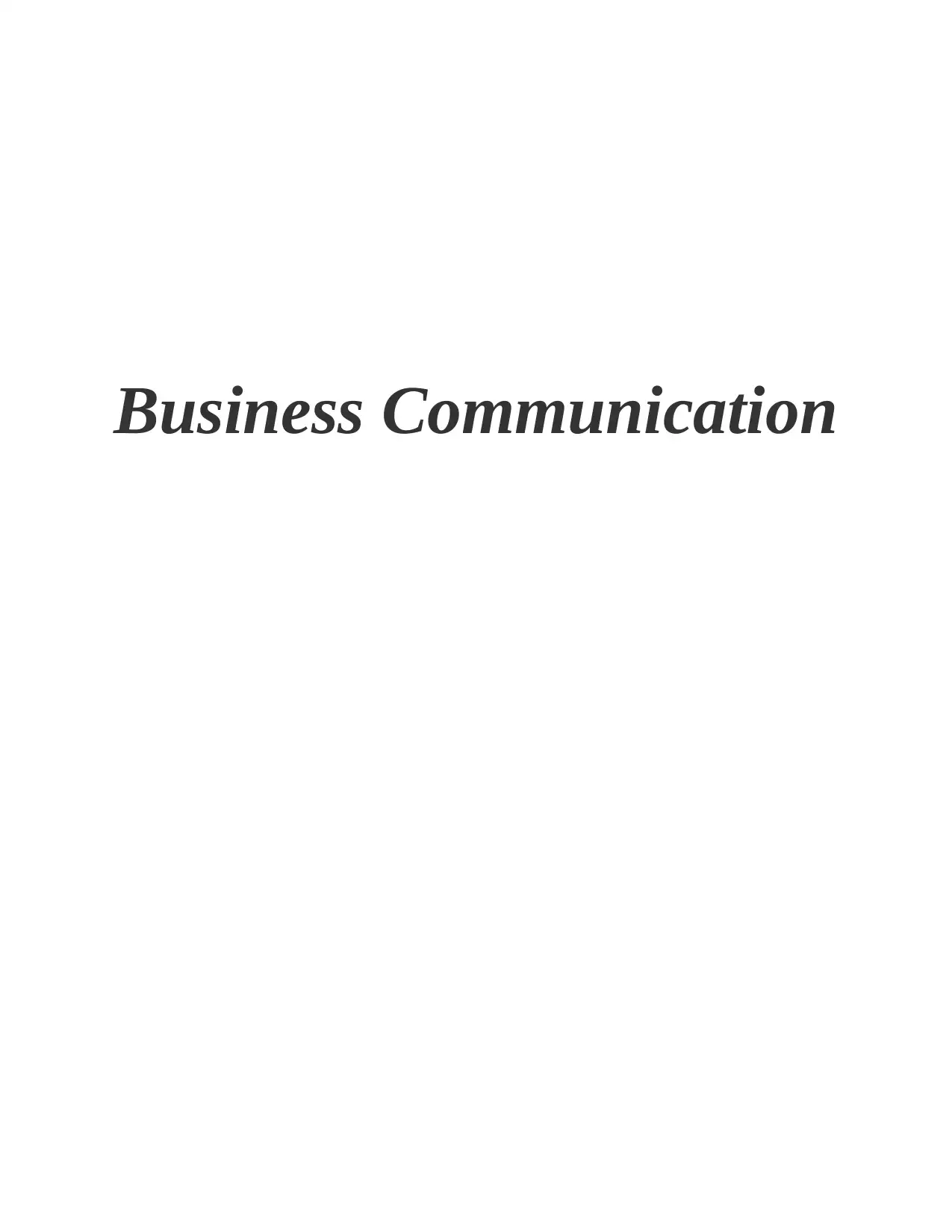
Business Communication
Paraphrase This Document
Need a fresh take? Get an instant paraphrase of this document with our AI Paraphraser
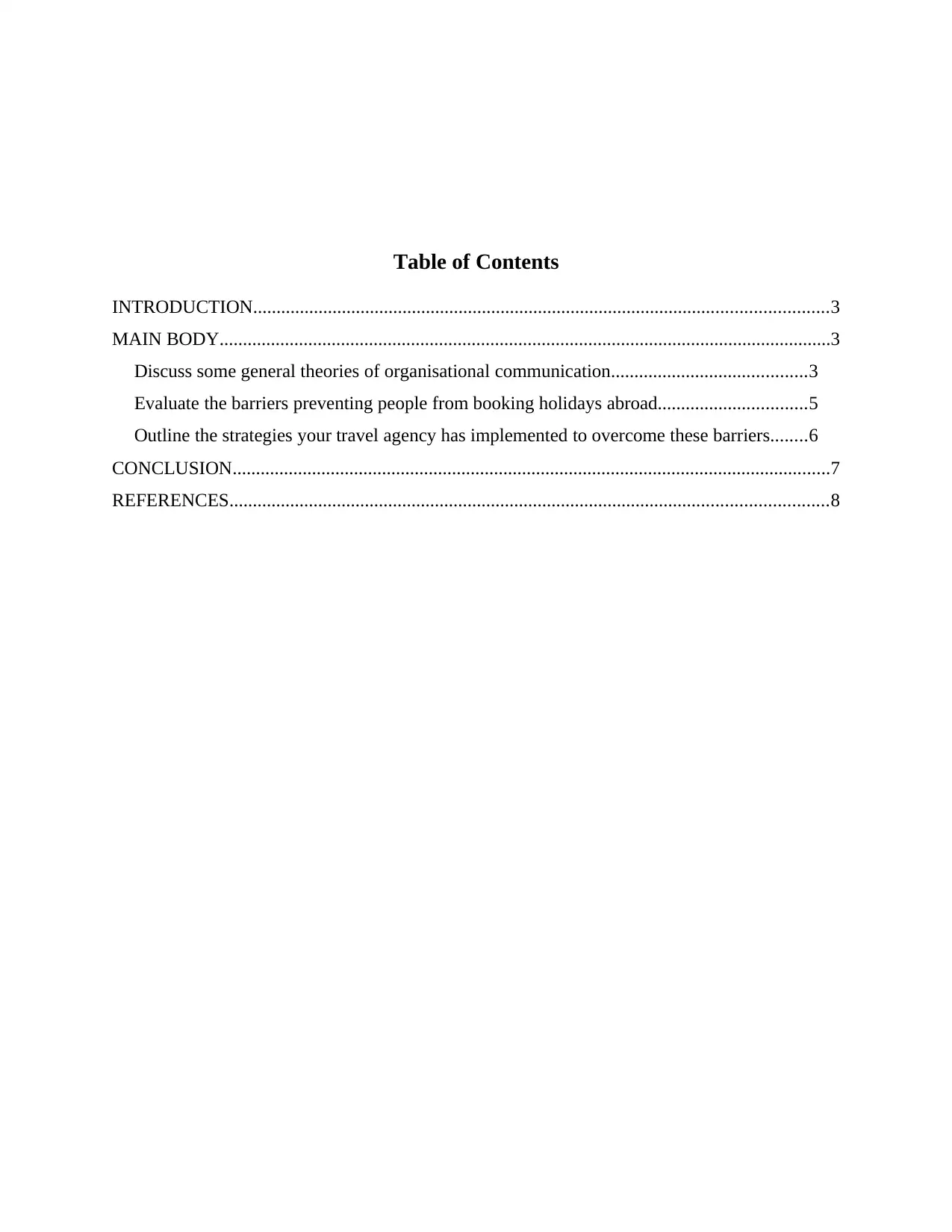
Table of Contents
INTRODUCTION...........................................................................................................................3
MAIN BODY...................................................................................................................................3
Discuss some general theories of organisational communication..........................................3
Evaluate the barriers preventing people from booking holidays abroad................................5
Outline the strategies your travel agency has implemented to overcome these barriers........6
CONCLUSION................................................................................................................................7
REFERENCES................................................................................................................................8
INTRODUCTION...........................................................................................................................3
MAIN BODY...................................................................................................................................3
Discuss some general theories of organisational communication..........................................3
Evaluate the barriers preventing people from booking holidays abroad................................5
Outline the strategies your travel agency has implemented to overcome these barriers........6
CONCLUSION................................................................................................................................7
REFERENCES................................................................................................................................8
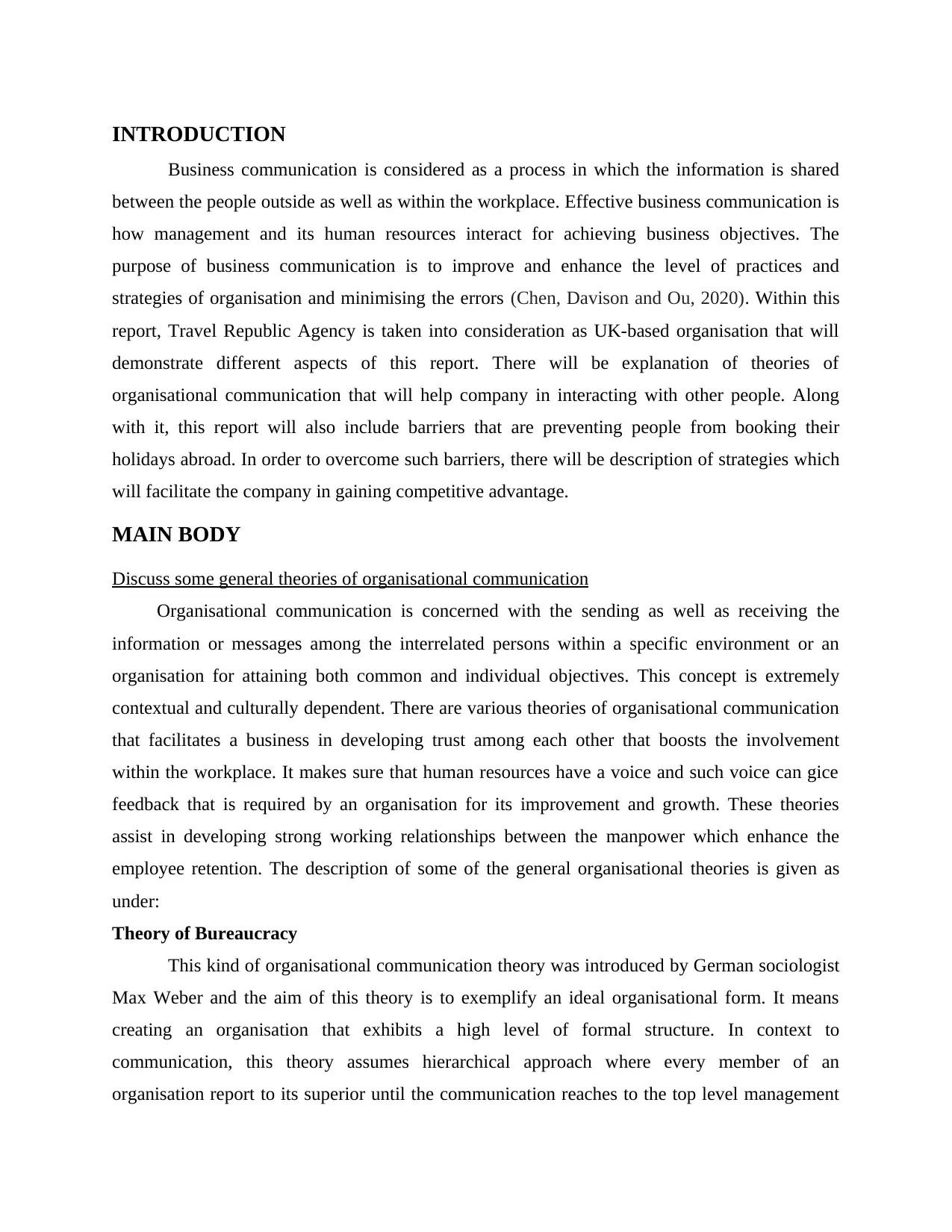
INTRODUCTION
Business communication is considered as a process in which the information is shared
between the people outside as well as within the workplace. Effective business communication is
how management and its human resources interact for achieving business objectives. The
purpose of business communication is to improve and enhance the level of practices and
strategies of organisation and minimising the errors (Chen, Davison and Ou, 2020). Within this
report, Travel Republic Agency is taken into consideration as UK-based organisation that will
demonstrate different aspects of this report. There will be explanation of theories of
organisational communication that will help company in interacting with other people. Along
with it, this report will also include barriers that are preventing people from booking their
holidays abroad. In order to overcome such barriers, there will be description of strategies which
will facilitate the company in gaining competitive advantage.
MAIN BODY
Discuss some general theories of organisational communication
Organisational communication is concerned with the sending as well as receiving the
information or messages among the interrelated persons within a specific environment or an
organisation for attaining both common and individual objectives. This concept is extremely
contextual and culturally dependent. There are various theories of organisational communication
that facilitates a business in developing trust among each other that boosts the involvement
within the workplace. It makes sure that human resources have a voice and such voice can gice
feedback that is required by an organisation for its improvement and growth. These theories
assist in developing strong working relationships between the manpower which enhance the
employee retention. The description of some of the general organisational theories is given as
under:
Theory of Bureaucracy
This kind of organisational communication theory was introduced by German sociologist
Max Weber and the aim of this theory is to exemplify an ideal organisational form. It means
creating an organisation that exhibits a high level of formal structure. In context to
communication, this theory assumes hierarchical approach where every member of an
organisation report to its superior until the communication reaches to the top level management
Business communication is considered as a process in which the information is shared
between the people outside as well as within the workplace. Effective business communication is
how management and its human resources interact for achieving business objectives. The
purpose of business communication is to improve and enhance the level of practices and
strategies of organisation and minimising the errors (Chen, Davison and Ou, 2020). Within this
report, Travel Republic Agency is taken into consideration as UK-based organisation that will
demonstrate different aspects of this report. There will be explanation of theories of
organisational communication that will help company in interacting with other people. Along
with it, this report will also include barriers that are preventing people from booking their
holidays abroad. In order to overcome such barriers, there will be description of strategies which
will facilitate the company in gaining competitive advantage.
MAIN BODY
Discuss some general theories of organisational communication
Organisational communication is concerned with the sending as well as receiving the
information or messages among the interrelated persons within a specific environment or an
organisation for attaining both common and individual objectives. This concept is extremely
contextual and culturally dependent. There are various theories of organisational communication
that facilitates a business in developing trust among each other that boosts the involvement
within the workplace. It makes sure that human resources have a voice and such voice can gice
feedback that is required by an organisation for its improvement and growth. These theories
assist in developing strong working relationships between the manpower which enhance the
employee retention. The description of some of the general organisational theories is given as
under:
Theory of Bureaucracy
This kind of organisational communication theory was introduced by German sociologist
Max Weber and the aim of this theory is to exemplify an ideal organisational form. It means
creating an organisation that exhibits a high level of formal structure. In context to
communication, this theory assumes hierarchical approach where every member of an
organisation report to its superior until the communication reaches to the top level management
⊘ This is a preview!⊘
Do you want full access?
Subscribe today to unlock all pages.

Trusted by 1+ million students worldwide
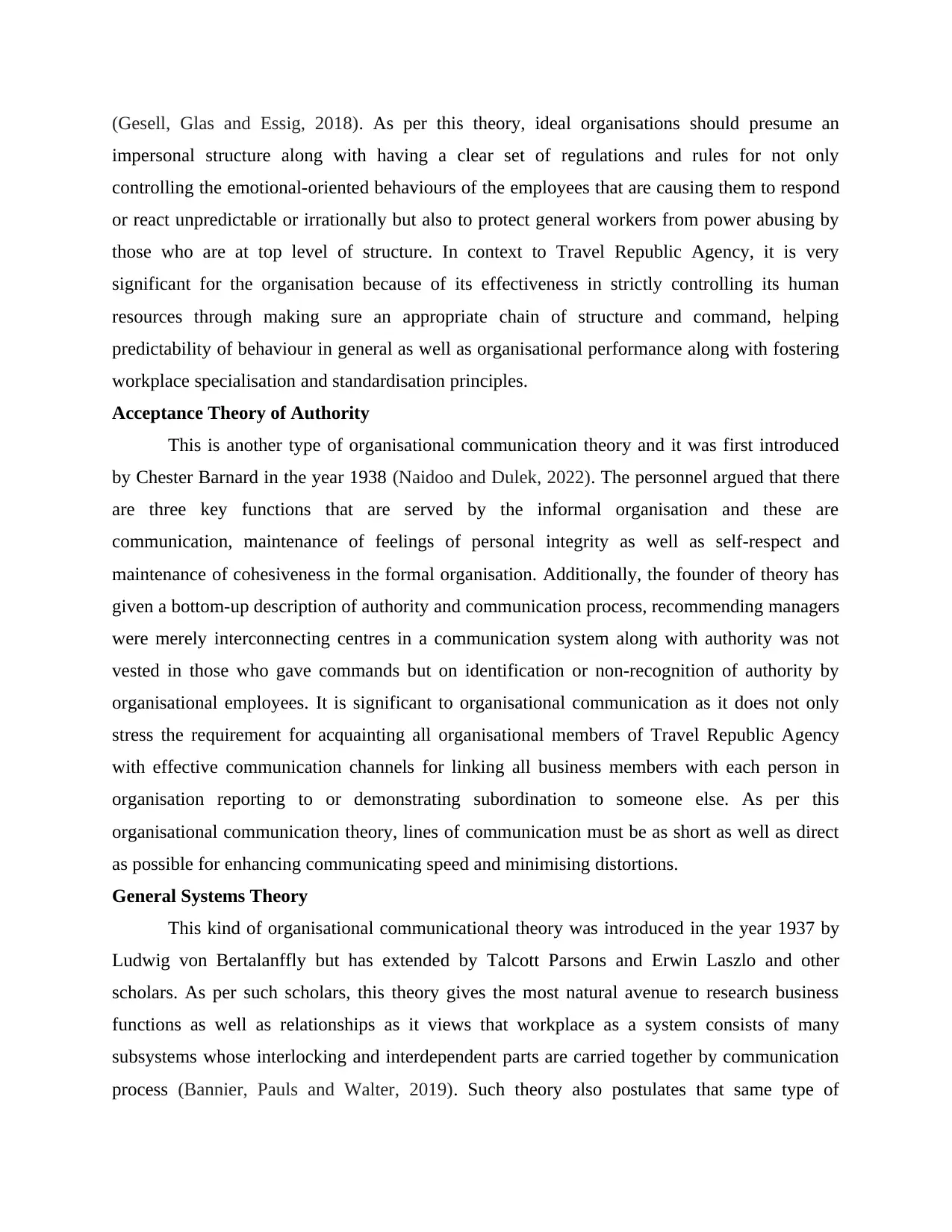
(Gesell, Glas and Essig, 2018). As per this theory, ideal organisations should presume an
impersonal structure along with having a clear set of regulations and rules for not only
controlling the emotional-oriented behaviours of the employees that are causing them to respond
or react unpredictable or irrationally but also to protect general workers from power abusing by
those who are at top level of structure. In context to Travel Republic Agency, it is very
significant for the organisation because of its effectiveness in strictly controlling its human
resources through making sure an appropriate chain of structure and command, helping
predictability of behaviour in general as well as organisational performance along with fostering
workplace specialisation and standardisation principles.
Acceptance Theory of Authority
This is another type of organisational communication theory and it was first introduced
by Chester Barnard in the year 1938 (Naidoo and Dulek, 2022). The personnel argued that there
are three key functions that are served by the informal organisation and these are
communication, maintenance of feelings of personal integrity as well as self-respect and
maintenance of cohesiveness in the formal organisation. Additionally, the founder of theory has
given a bottom-up description of authority and communication process, recommending managers
were merely interconnecting centres in a communication system along with authority was not
vested in those who gave commands but on identification or non-recognition of authority by
organisational employees. It is significant to organisational communication as it does not only
stress the requirement for acquainting all organisational members of Travel Republic Agency
with effective communication channels for linking all business members with each person in
organisation reporting to or demonstrating subordination to someone else. As per this
organisational communication theory, lines of communication must be as short as well as direct
as possible for enhancing communicating speed and minimising distortions.
General Systems Theory
This kind of organisational communicational theory was introduced in the year 1937 by
Ludwig von Bertalanffly but has extended by Talcott Parsons and Erwin Laszlo and other
scholars. As per such scholars, this theory gives the most natural avenue to research business
functions as well as relationships as it views that workplace as a system consists of many
subsystems whose interlocking and interdependent parts are carried together by communication
process (Bannier, Pauls and Walter, 2019). Such theory also postulates that same type of
impersonal structure along with having a clear set of regulations and rules for not only
controlling the emotional-oriented behaviours of the employees that are causing them to respond
or react unpredictable or irrationally but also to protect general workers from power abusing by
those who are at top level of structure. In context to Travel Republic Agency, it is very
significant for the organisation because of its effectiveness in strictly controlling its human
resources through making sure an appropriate chain of structure and command, helping
predictability of behaviour in general as well as organisational performance along with fostering
workplace specialisation and standardisation principles.
Acceptance Theory of Authority
This is another type of organisational communication theory and it was first introduced
by Chester Barnard in the year 1938 (Naidoo and Dulek, 2022). The personnel argued that there
are three key functions that are served by the informal organisation and these are
communication, maintenance of feelings of personal integrity as well as self-respect and
maintenance of cohesiveness in the formal organisation. Additionally, the founder of theory has
given a bottom-up description of authority and communication process, recommending managers
were merely interconnecting centres in a communication system along with authority was not
vested in those who gave commands but on identification or non-recognition of authority by
organisational employees. It is significant to organisational communication as it does not only
stress the requirement for acquainting all organisational members of Travel Republic Agency
with effective communication channels for linking all business members with each person in
organisation reporting to or demonstrating subordination to someone else. As per this
organisational communication theory, lines of communication must be as short as well as direct
as possible for enhancing communicating speed and minimising distortions.
General Systems Theory
This kind of organisational communicational theory was introduced in the year 1937 by
Ludwig von Bertalanffly but has extended by Talcott Parsons and Erwin Laszlo and other
scholars. As per such scholars, this theory gives the most natural avenue to research business
functions as well as relationships as it views that workplace as a system consists of many
subsystems whose interlocking and interdependent parts are carried together by communication
process (Bannier, Pauls and Walter, 2019). Such theory also postulates that same type of
Paraphrase This Document
Need a fresh take? Get an instant paraphrase of this document with our AI Paraphraser
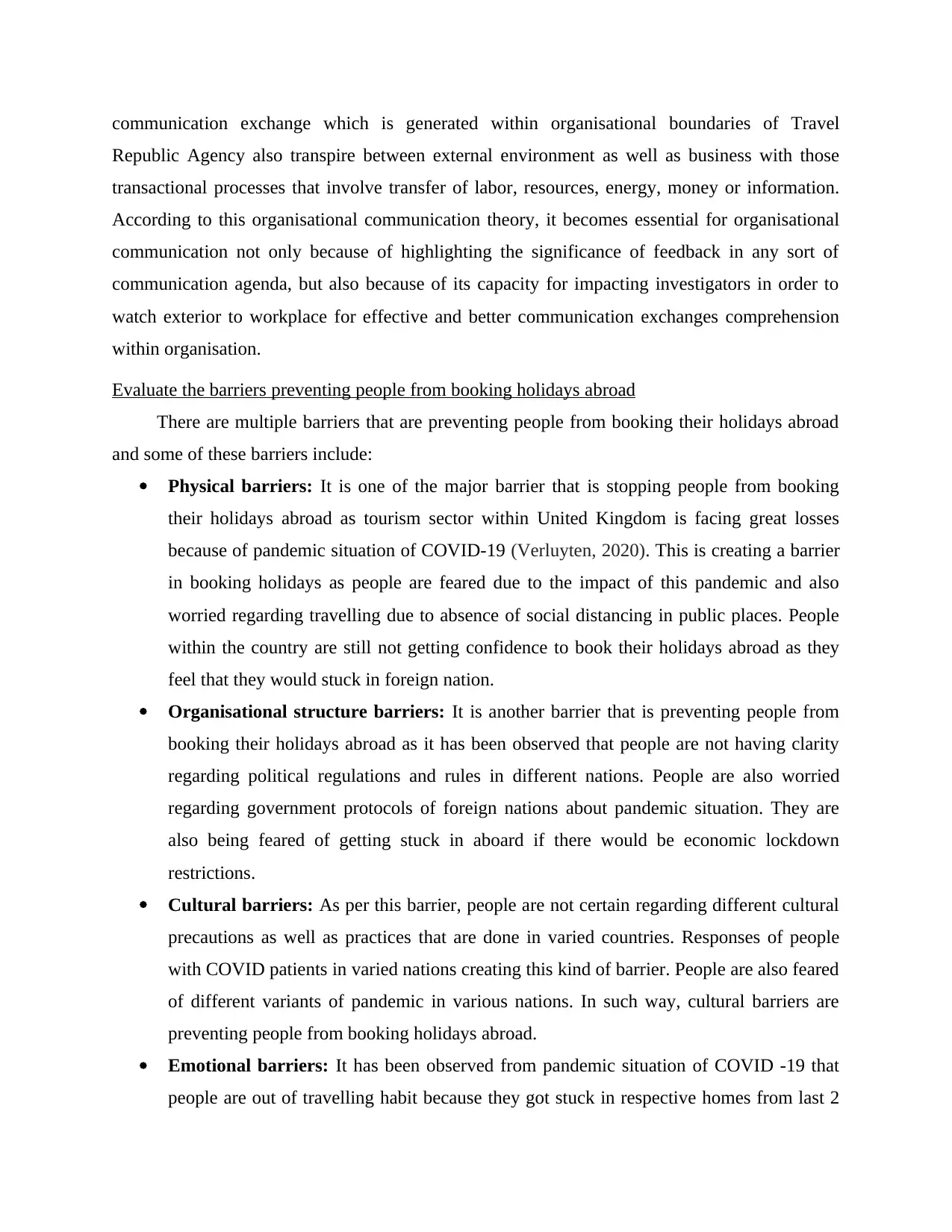
communication exchange which is generated within organisational boundaries of Travel
Republic Agency also transpire between external environment as well as business with those
transactional processes that involve transfer of labor, resources, energy, money or information.
According to this organisational communication theory, it becomes essential for organisational
communication not only because of highlighting the significance of feedback in any sort of
communication agenda, but also because of its capacity for impacting investigators in order to
watch exterior to workplace for effective and better communication exchanges comprehension
within organisation.
Evaluate the barriers preventing people from booking holidays abroad
There are multiple barriers that are preventing people from booking their holidays abroad
and some of these barriers include:
Physical barriers: It is one of the major barrier that is stopping people from booking
their holidays abroad as tourism sector within United Kingdom is facing great losses
because of pandemic situation of COVID-19 (Verluyten, 2020). This is creating a barrier
in booking holidays as people are feared due to the impact of this pandemic and also
worried regarding travelling due to absence of social distancing in public places. People
within the country are still not getting confidence to book their holidays abroad as they
feel that they would stuck in foreign nation.
Organisational structure barriers: It is another barrier that is preventing people from
booking their holidays abroad as it has been observed that people are not having clarity
regarding political regulations and rules in different nations. People are also worried
regarding government protocols of foreign nations about pandemic situation. They are
also being feared of getting stuck in aboard if there would be economic lockdown
restrictions.
Cultural barriers: As per this barrier, people are not certain regarding different cultural
precautions as well as practices that are done in varied countries. Responses of people
with COVID patients in varied nations creating this kind of barrier. People are also feared
of different variants of pandemic in various nations. In such way, cultural barriers are
preventing people from booking holidays abroad.
Emotional barriers: It has been observed from pandemic situation of COVID -19 that
people are out of travelling habit because they got stuck in respective homes from last 2
Republic Agency also transpire between external environment as well as business with those
transactional processes that involve transfer of labor, resources, energy, money or information.
According to this organisational communication theory, it becomes essential for organisational
communication not only because of highlighting the significance of feedback in any sort of
communication agenda, but also because of its capacity for impacting investigators in order to
watch exterior to workplace for effective and better communication exchanges comprehension
within organisation.
Evaluate the barriers preventing people from booking holidays abroad
There are multiple barriers that are preventing people from booking their holidays abroad
and some of these barriers include:
Physical barriers: It is one of the major barrier that is stopping people from booking
their holidays abroad as tourism sector within United Kingdom is facing great losses
because of pandemic situation of COVID-19 (Verluyten, 2020). This is creating a barrier
in booking holidays as people are feared due to the impact of this pandemic and also
worried regarding travelling due to absence of social distancing in public places. People
within the country are still not getting confidence to book their holidays abroad as they
feel that they would stuck in foreign nation.
Organisational structure barriers: It is another barrier that is preventing people from
booking their holidays abroad as it has been observed that people are not having clarity
regarding political regulations and rules in different nations. People are also worried
regarding government protocols of foreign nations about pandemic situation. They are
also being feared of getting stuck in aboard if there would be economic lockdown
restrictions.
Cultural barriers: As per this barrier, people are not certain regarding different cultural
precautions as well as practices that are done in varied countries. Responses of people
with COVID patients in varied nations creating this kind of barrier. People are also feared
of different variants of pandemic in various nations. In such way, cultural barriers are
preventing people from booking holidays abroad.
Emotional barriers: It has been observed from pandemic situation of COVID -19 that
people are out of travelling habit because they got stuck in respective homes from last 2
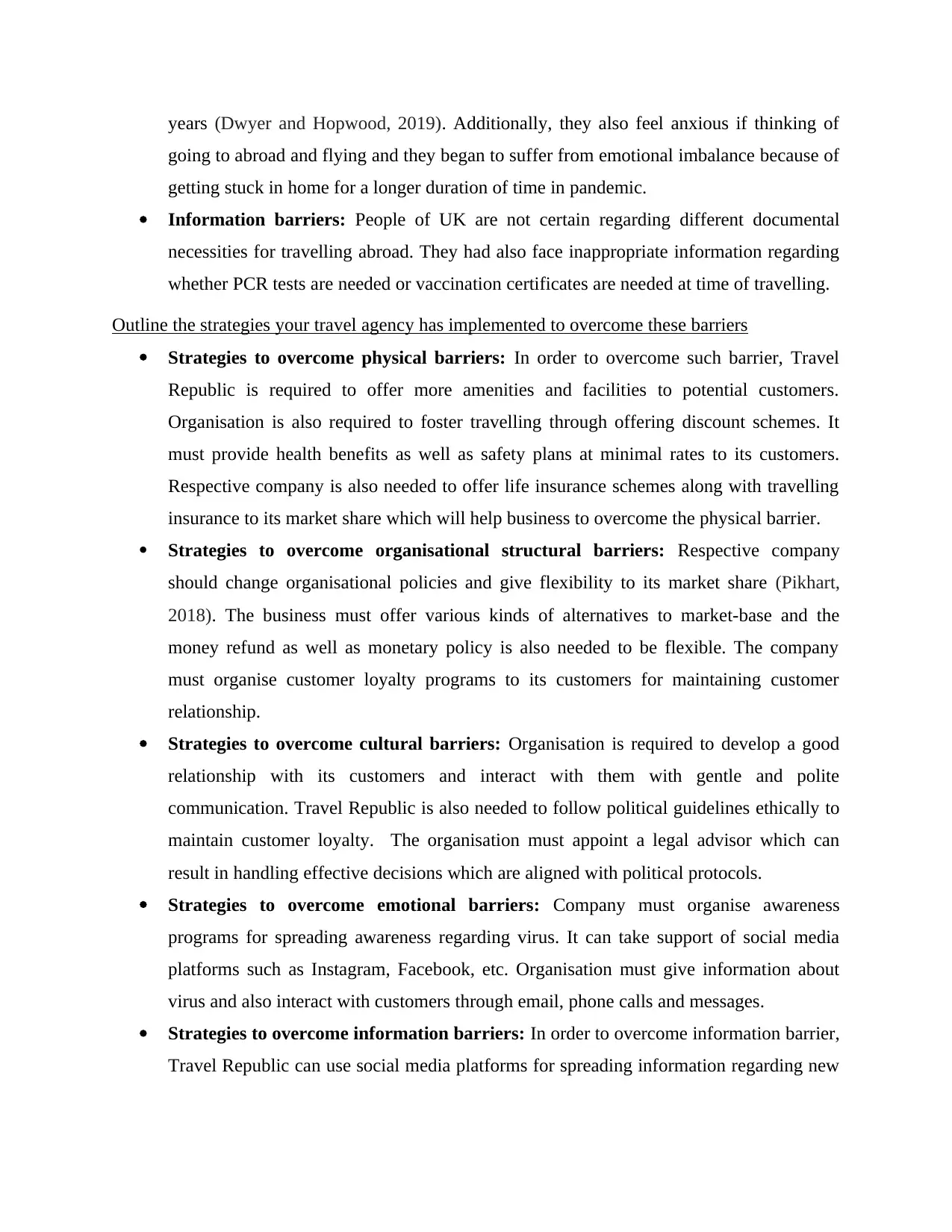
years (Dwyer and Hopwood, 2019). Additionally, they also feel anxious if thinking of
going to abroad and flying and they began to suffer from emotional imbalance because of
getting stuck in home for a longer duration of time in pandemic.
Information barriers: People of UK are not certain regarding different documental
necessities for travelling abroad. They had also face inappropriate information regarding
whether PCR tests are needed or vaccination certificates are needed at time of travelling.
Outline the strategies your travel agency has implemented to overcome these barriers
Strategies to overcome physical barriers: In order to overcome such barrier, Travel
Republic is required to offer more amenities and facilities to potential customers.
Organisation is also required to foster travelling through offering discount schemes. It
must provide health benefits as well as safety plans at minimal rates to its customers.
Respective company is also needed to offer life insurance schemes along with travelling
insurance to its market share which will help business to overcome the physical barrier.
Strategies to overcome organisational structural barriers: Respective company
should change organisational policies and give flexibility to its market share (Pikhart,
2018). The business must offer various kinds of alternatives to market-base and the
money refund as well as monetary policy is also needed to be flexible. The company
must organise customer loyalty programs to its customers for maintaining customer
relationship.
Strategies to overcome cultural barriers: Organisation is required to develop a good
relationship with its customers and interact with them with gentle and polite
communication. Travel Republic is also needed to follow political guidelines ethically to
maintain customer loyalty. The organisation must appoint a legal advisor which can
result in handling effective decisions which are aligned with political protocols.
Strategies to overcome emotional barriers: Company must organise awareness
programs for spreading awareness regarding virus. It can take support of social media
platforms such as Instagram, Facebook, etc. Organisation must give information about
virus and also interact with customers through email, phone calls and messages.
Strategies to overcome information barriers: In order to overcome information barrier,
Travel Republic can use social media platforms for spreading information regarding new
going to abroad and flying and they began to suffer from emotional imbalance because of
getting stuck in home for a longer duration of time in pandemic.
Information barriers: People of UK are not certain regarding different documental
necessities for travelling abroad. They had also face inappropriate information regarding
whether PCR tests are needed or vaccination certificates are needed at time of travelling.
Outline the strategies your travel agency has implemented to overcome these barriers
Strategies to overcome physical barriers: In order to overcome such barrier, Travel
Republic is required to offer more amenities and facilities to potential customers.
Organisation is also required to foster travelling through offering discount schemes. It
must provide health benefits as well as safety plans at minimal rates to its customers.
Respective company is also needed to offer life insurance schemes along with travelling
insurance to its market share which will help business to overcome the physical barrier.
Strategies to overcome organisational structural barriers: Respective company
should change organisational policies and give flexibility to its market share (Pikhart,
2018). The business must offer various kinds of alternatives to market-base and the
money refund as well as monetary policy is also needed to be flexible. The company
must organise customer loyalty programs to its customers for maintaining customer
relationship.
Strategies to overcome cultural barriers: Organisation is required to develop a good
relationship with its customers and interact with them with gentle and polite
communication. Travel Republic is also needed to follow political guidelines ethically to
maintain customer loyalty. The organisation must appoint a legal advisor which can
result in handling effective decisions which are aligned with political protocols.
Strategies to overcome emotional barriers: Company must organise awareness
programs for spreading awareness regarding virus. It can take support of social media
platforms such as Instagram, Facebook, etc. Organisation must give information about
virus and also interact with customers through email, phone calls and messages.
Strategies to overcome information barriers: In order to overcome information barrier,
Travel Republic can use social media platforms for spreading information regarding new
⊘ This is a preview!⊘
Do you want full access?
Subscribe today to unlock all pages.

Trusted by 1+ million students worldwide
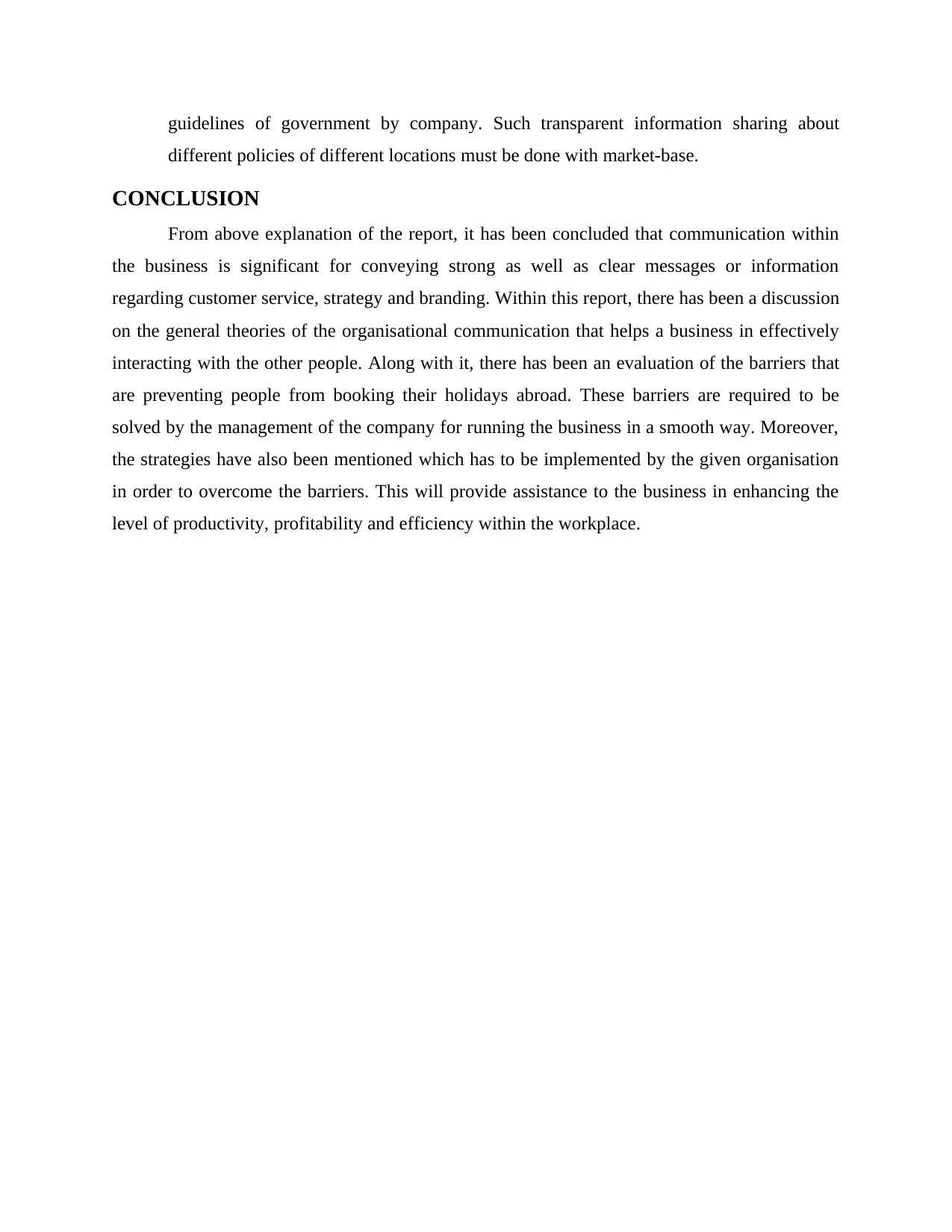
guidelines of government by company. Such transparent information sharing about
different policies of different locations must be done with market-base.
CONCLUSION
From above explanation of the report, it has been concluded that communication within
the business is significant for conveying strong as well as clear messages or information
regarding customer service, strategy and branding. Within this report, there has been a discussion
on the general theories of the organisational communication that helps a business in effectively
interacting with the other people. Along with it, there has been an evaluation of the barriers that
are preventing people from booking their holidays abroad. These barriers are required to be
solved by the management of the company for running the business in a smooth way. Moreover,
the strategies have also been mentioned which has to be implemented by the given organisation
in order to overcome the barriers. This will provide assistance to the business in enhancing the
level of productivity, profitability and efficiency within the workplace.
different policies of different locations must be done with market-base.
CONCLUSION
From above explanation of the report, it has been concluded that communication within
the business is significant for conveying strong as well as clear messages or information
regarding customer service, strategy and branding. Within this report, there has been a discussion
on the general theories of the organisational communication that helps a business in effectively
interacting with the other people. Along with it, there has been an evaluation of the barriers that
are preventing people from booking their holidays abroad. These barriers are required to be
solved by the management of the company for running the business in a smooth way. Moreover,
the strategies have also been mentioned which has to be implemented by the given organisation
in order to overcome the barriers. This will provide assistance to the business in enhancing the
level of productivity, profitability and efficiency within the workplace.
Paraphrase This Document
Need a fresh take? Get an instant paraphrase of this document with our AI Paraphraser
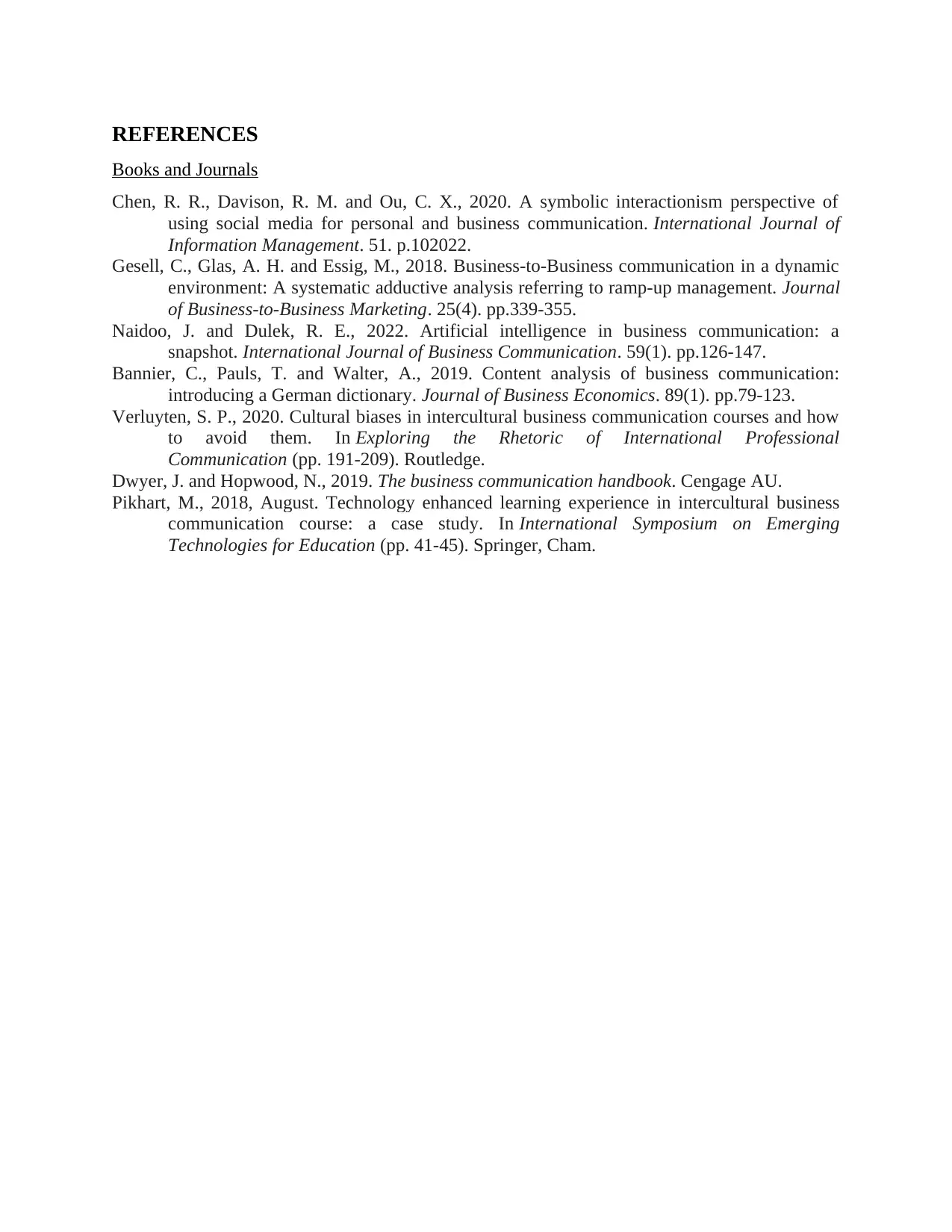
REFERENCES
Books and Journals
Chen, R. R., Davison, R. M. and Ou, C. X., 2020. A symbolic interactionism perspective of
using social media for personal and business communication. International Journal of
Information Management. 51. p.102022.
Gesell, C., Glas, A. H. and Essig, M., 2018. Business-to-Business communication in a dynamic
environment: A systematic adductive analysis referring to ramp-up management. Journal
of Business-to-Business Marketing. 25(4). pp.339-355.
Naidoo, J. and Dulek, R. E., 2022. Artificial intelligence in business communication: a
snapshot. International Journal of Business Communication. 59(1). pp.126-147.
Bannier, C., Pauls, T. and Walter, A., 2019. Content analysis of business communication:
introducing a German dictionary. Journal of Business Economics. 89(1). pp.79-123.
Verluyten, S. P., 2020. Cultural biases in intercultural business communication courses and how
to avoid them. In Exploring the Rhetoric of International Professional
Communication (pp. 191-209). Routledge.
Dwyer, J. and Hopwood, N., 2019. The business communication handbook. Cengage AU.
Pikhart, M., 2018, August. Technology enhanced learning experience in intercultural business
communication course: a case study. In International Symposium on Emerging
Technologies for Education (pp. 41-45). Springer, Cham.
Books and Journals
Chen, R. R., Davison, R. M. and Ou, C. X., 2020. A symbolic interactionism perspective of
using social media for personal and business communication. International Journal of
Information Management. 51. p.102022.
Gesell, C., Glas, A. H. and Essig, M., 2018. Business-to-Business communication in a dynamic
environment: A systematic adductive analysis referring to ramp-up management. Journal
of Business-to-Business Marketing. 25(4). pp.339-355.
Naidoo, J. and Dulek, R. E., 2022. Artificial intelligence in business communication: a
snapshot. International Journal of Business Communication. 59(1). pp.126-147.
Bannier, C., Pauls, T. and Walter, A., 2019. Content analysis of business communication:
introducing a German dictionary. Journal of Business Economics. 89(1). pp.79-123.
Verluyten, S. P., 2020. Cultural biases in intercultural business communication courses and how
to avoid them. In Exploring the Rhetoric of International Professional
Communication (pp. 191-209). Routledge.
Dwyer, J. and Hopwood, N., 2019. The business communication handbook. Cengage AU.
Pikhart, M., 2018, August. Technology enhanced learning experience in intercultural business
communication course: a case study. In International Symposium on Emerging
Technologies for Education (pp. 41-45). Springer, Cham.
1 out of 8
Related Documents
Your All-in-One AI-Powered Toolkit for Academic Success.
+13062052269
info@desklib.com
Available 24*7 on WhatsApp / Email
![[object Object]](/_next/static/media/star-bottom.7253800d.svg)
Unlock your academic potential
Copyright © 2020–2026 A2Z Services. All Rights Reserved. Developed and managed by ZUCOL.





